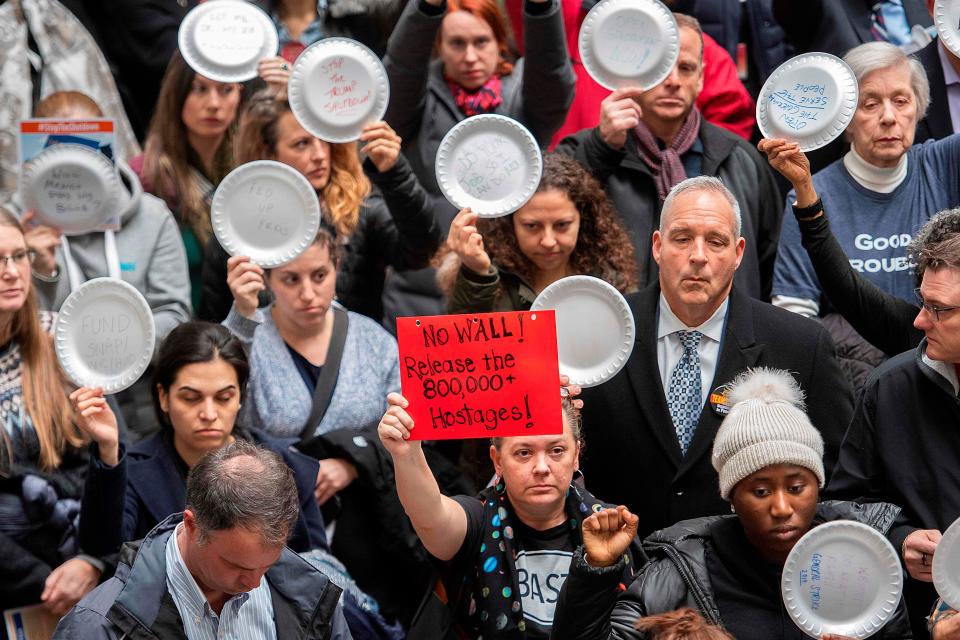Is Trump's proposed 1% raise and benefit cuts for federal employees fair?
President Donald Trump this week proposed a modest 1% pay increase and less generous retirement benefits for federal workers.
The proposal, included in Trump’s fiscal 2021 budget blueprint, is reigniting a longstanding debate over whether federal employees earn too much, or too little, compared to their private-sector counterparts.
The president’s budget cites a 2017 Congressional Budget Office study that found federal workers’ total compensation on average is 17% higher than private-sector workers in similar jobs, chiefly because of their benefits.
“CBO found that, in comparison to the private sector, the federal government continues to offer a very generous package of retirement benefits,” the budget plan says.
Trump and Social Security: Here’s what president's proposed budget could mean for your benefits
Trump and student loans: Which student loan programs would vanish if Trump's proposed budget goes through?
Federal employee advocates disagreed.
“For an administration that has added $3 trillion to the federal debt, gouging federal employee pay and benefits in the name of deficit reduction is ridiculous,” Tony Reardon, president of the National Treasury Employees Union, said in a statement.
“For the fourth year in a row, President Trump’s budget proposal would starve federal agencies to the point of paralysis, pick the pockets of middle-class federal workers and their families, weaken our nation’s nonpartisan merit-based civil service, and deprive Americans of the basic services and protections that expect from their government.”
The Federal Salary Council – which includes experts in labor relations and pay policy, as well as labor union representatives – found last year that federal employees earn an average 27% less than their private-sector counterparts. That analysis, however, did not take benefits into account.

Bezos splurges: Amazon CEO Jeff Bezos buys $165-million Los Angeles mansion owned by David Geffen, reports say
Here are the issues:
Is Trump’s proposal likely to be the final word on federal workers’ raises?
Probably not. Under legislation introduced by Democrats in both the House and Senate, federal employees would receive an average 3.5% raise in fiscal 2021. For the prior year, Trump recommended a pay freeze but eventually agreed to an average 3.1% pay increase after negotiating with Congress. That included a 2.6% across-the-board bump and a varying premium based on locality.
How does Trump’s proposed 1% increase compare with private-sector raises?
Hourly wage increases for private workers across the U.S. averaged 3.1% annually in January, according to the Labor Department. Pay gains averaged 3.1% in manufacturing, 2.9% in construction, 4.1% in retail, 3.7% in financial activities, 3.4% in leisure and hospitality and 1.5% in education and health services.
What’s the main argument in support of Trump’s slight pay increase and retirement benefit changes?
Chris Edwards, an economist at the libertarian Cato Institute, says a 1% raise is reasonable considering many federal workers get wage bumps as they periodically rise through 10 steps, as well as across-the-board raises. He also says the modest increase makes sense in light of the disparity in benefits between federal and private-sector workers.
Edwards also back’s Trump’s proposal to curtail federal retirement benefits and require workers to contribute more toward those benefits. He notes that federal workers receive both a defined contribution plan, like a 401(k), and a defined benefit plan, such as a pension.
“The administration’s proposals to trim the federal defined benefit plan are a modest step given that such plans have mainly disappeared in the private sector,” Edwards says.
What do opponents of Trump’s plan say?
Daniel Zhao, a senior economist at job posting site Glassdoor, notes that employers are struggling to attract workers amid historically low unemployment. “The federal government isn’t immune from today’s highly competitive labor market and must battle for the same qualified workers as their often higher-paying private sector counterparts,” Zhao says.
Sudarshan Sampath, director of research at PayScale, a compensation software and data firm, says federal salaries are significantly lower than private wages for high-skilled jobs in fields such as cybersecurity and intelligence, potentially putting the country at a disadvantage.
“You can’t just expect their desire to work for the country” to prompt skilled workers to accept lower pay, Sampath says.
Social Security in the crosshairs: Social Security: Here’s what Trump’s proposed budget could mean for your benefits
The CBO has found that from 2011 to 2015, federal workers with a high school diploma or less earned 34% more on average than similar private-sector workers. But federal workers with professional degrees or doctorates earned 24% less than comparable employees at American businesses.
This article originally appeared on USA TODAY: Trump budget: Is president's 1% raise for government workers fair?

